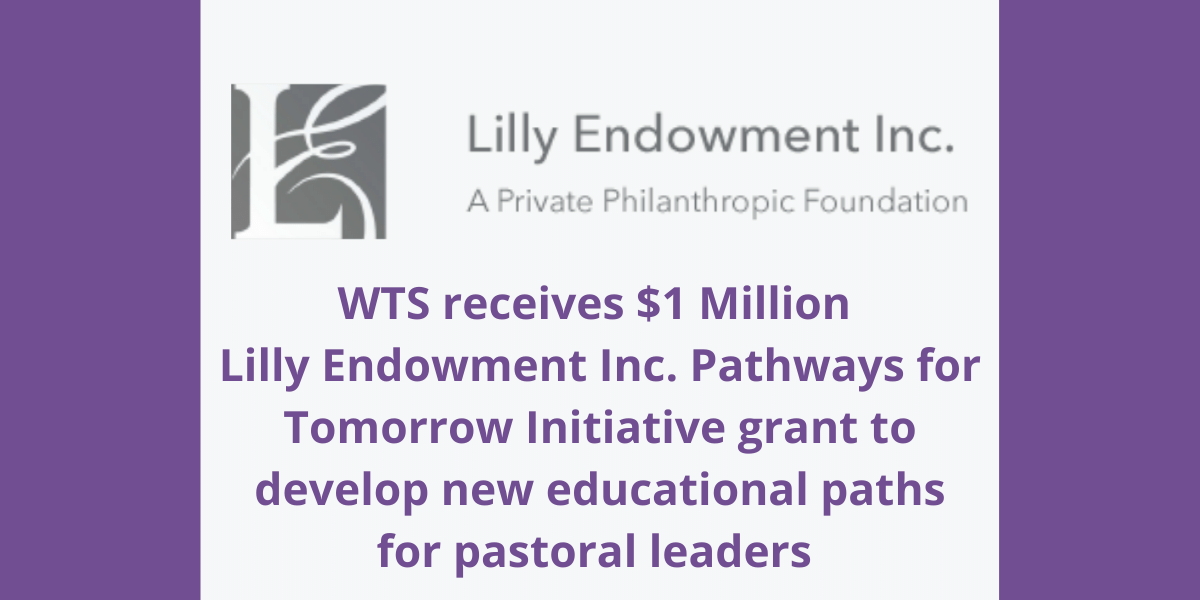
Washington, DC (December 22, 2021) -Wesley Theological Seminary has received a grant of $1 million from Lilly Endowment Inc. to develop new educational paths for pastoral leaders in diverse contexts and to develop a business model that supports broadened educational offerings.
The effort is being funded through Lilly Endowment’s Pathways for Tomorrow Initiative. It is a three-phase initiative designed to help theological schools across the United States and Canada as they prioritize and respond to the most pressing challenges they face as they prepare pastoral leaders for Christian congregations both now and into the future.
Wesley’s project builds on extensive research done through the Religious Workforce Project, a $2 million, three-year Lilly Endowment-funded study conducted by Wesley’s Lewis Center for Church Leadership to understand the changing employment patterns of local churches, denominations, and other faith-based ministries. As the research reveals ever-greater diversification of pastoral vocations, Wesley will develop more theological education offerings tailored in content, length, and price, including and beyond the traditional graduate school model, to prepare a variety of pastoral leaders for the many evolving forms of the future church. This model of “comprehensive theological education,” described by President David McAllister-Wilson in his 2017 book, A New Church and a New Seminary: Theological Education is the Solution, would maintain the quality of and improve access to master’s programs while also developing a regular suite of pre-, post-, and non-degree offerings to meet the professional needs of the various forms of pastoral ministry, long-standing and emerging, that have not been well served by seminaries.
“At Wesley, we have long understood that seminaries have the experience, technology, and established faculty and staff to become centers for comprehensive theological education for the whole church,” McAllister-Wilson said. “Through this initiative, we will develop the educational pathways necessary to better serve pastoral leaders while also developing proofs of concept and collaborations that could transform the larger system for identifying, training, and supporting congregational ministers.”
Wesley is one of 84 theological schools that are receiving a total of more than $82 million in grants through the second phase of the Pathways initiative. Together, the schools represent evangelical, mainline Protestant, nondenominational, Pentecostal, Roman Catholic and Black church and historic peace church traditions (e.g., Church of the Brethren, Mennonite, Quakers). Many schools also serve students and pastors from Black, Latino, Korean American, Chinese American and recent immigrant Christian communities.
“Theological schools have long played a pivotal role in preparing pastoral leaders for churches,” said Christopher L. Coble, Lilly Endowment’s vice president for religion. “Today, these schools find themselves in a period of rapid and profound change. Through the Pathways Initiative, theological schools will take deliberate steps to address the challenges they have identified in ways that make the most sense to them. We believe that their efforts are critical to ensuring that Christian congregations continue to have a steady stream of pastoral leaders who are well-prepared to lead the churches of tomorrow.”
Lilly Endowment launched the Pathways initiative in January 2021 because of its longstanding interest in supporting efforts to enhance and sustain the vitality of Christian congregations by strengthening the leadership capacities of pastors and congregational lay leaders.
About Lilly Endowment Inc.
Lilly Endowment Inc. is an Indianapolis-based private philanthropic foundation created in 1937 by J.K. Lilly, Sr. and his sons Eli and J.K. Jr. through gifts of stock in their pharmaceutical business, Eli Lilly and Company. Although the gifts of stock remain a financial bedrock of the Endowment, it is a separate entity from the company, with a distinct governing board, staff and location. In keeping with the founders’ wishes, the Endowment supports the causes of community development, education and religion and maintains a special commitment to its founders’ hometown, Indianapolis, and home state, Indiana. The primary aim of its grantmaking in religion, which is national in scope, focuses on strengthening the leadership and vitality of Christian congregations in the United States. The Endowment also seeks to foster public understanding about religion and lift up in fair, accurate and balanced ways the contributions that people of all faiths and religious communities make to our greater civic well-being.
###
